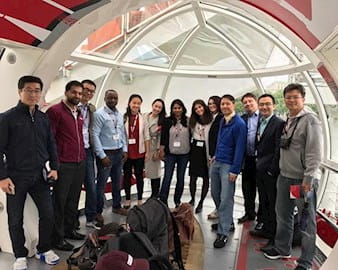
As a Chicago Booth Executive MBA student, a large part of your experience will be working in study groups. Current student, Kavitha Rajaram, offers some advice on making the most of your MBA study group.
- By
- January 25, 2019
- Executive MBA - Community

Working in study groups provides a view into the real world dynamics of managing people and projects in the corporate world.
In a program like the Executive MBA, however, students already come with rich experiences leading large projects and employees. At times, it can feel jarring to find yourself back in a study group setting.

From the start, most courses in the Executive MBA program involve group work and assignments. This often means collaborating with team members across boundaries, time zones, and varying expertise to achieve a shared goal.
I have participated in a multicultural study group during my time at the Hong Kong campus, and have found the benefits to be immense. The program is rigorous, and there is a lot that we can learn from each other to help us get through. Here are my top five ways that study groups help you in the MBA Program:
Study groups force you to make a plan ahead of time. The course work during and in between class weeks can be overwhelming. Planning work ahead of time in terms of distributing assignments among the team members and finishing pre-work before the actual class week really helps alleviate stress. To accomplish all of this, it’s important to determine expectations and assign roles.
You learn from each other’s strengths. Paying attention to each team member and identifying each one’s strengths can optimize the team—these are really smart people! For instance, some team members may be strong in quant or come from a finance background and they can help to anchor the team for Finance related courses.
Working together encourages good decision-making. Decision-making involves open communication and consensus. Discussing, debating and deliberating as a group yields innovative responses to solutions you may not have arrived at yourself.
Subtle and open feedback mechanisms: It is important for your team not to settle for the “status quo.” Instead, it helps to continue to engage in positive conversations to align to the overall stated goals of the team.
It’s a chance to have fun. Exploring the city of the local campus or trying the various local cuisines proves to be a great team-bonding exercise. In the anxiety of coping with the frenzied pace of the class weeks, connecting with the team members fosters a great camaraderie.
I have had the good fortune to work closely with classmates from eight different nationalities in my time at Booth thus far and after working with them, I have gained positive insights and shared encouraging vibes. After many months of study, they have become more than just study group members—they are friends for life!